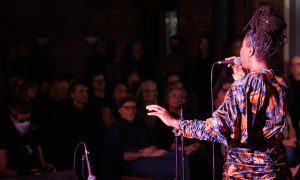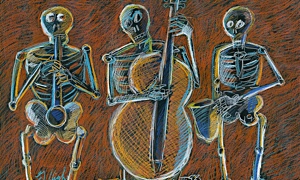Home » Jazz Articles » What is Jazz? » Seattle Jazz Fellowship: A New Age In A New Space
Seattle Jazz Fellowship: A New Age In A New Space

Courtesy Jim Levitt
Jazz attracts an audience that knows how to listen.
—Julian Priester
The Seattle Jazz Fellowship is built on raising funds through donations, grants and memberships. More than 700 patrons have become members, a privilege that allows them to gain entrance into shows for a full year. Non-members may choose to enter a performance with a suggested $20 donation. On January 26, 2024, the nonprofit realized its dream of opening their own space, a place to gather in music and fellowship. That space is in the historic Globe Building in the city's first neighborhood, Pioneer Square. With standing room included, the all-ages room accommodates 80-90 guests, serves beer and wine and functions as a jazz performance room—in essential terms, a community clubhouse for the local jazz scene. It sits in the center of the rapidly revitalized historic district of late 19th century brick and stone buildings. The city is in the process of reviving this historic neighborhood in such a way that encourages pedestrians and ties into the city's waterfront that for years was essentially inaccessible to the public. The removal of a hideous elevated viaduct that carried Highway 99 through the downtown area, and Seattle's mammoth waterfront recovery project has given new life to Pioneer Square in its desired revitalization. Once the center of nightlife and in particular, local live music in Seattle, the inclusion of The Seattle Jazz Fellowship in both its macro and micro view of the new Pioneer Square is significant. Art galleries, bookstores, eateries, bars and music venues have begun to spring back to life, whether they be new ventures or businesses well established over time.
The Fellowship provides live local jazz each Thursday, Friday and Saturday, with an all-ages jam session on Monday nights. Local drummer

Julian Priester
tromboneb.1935
The Seattle Jazz Fellowship was put into action by Seattle trumpeter

Thomas Marriott
trumpetb.1975
The resulting move to Pioneer Square has produced a full-time jazz venue that due to its nonprofit model, can pay musicians a living wage regardless of ticket sales or covers. The guaranteed wage enables artists to choose musicians and rehearse, in essence, giving their very best on the Fellowship stage. To date, the nonprofit has paid out over $320,000 to area musicians, a number growing by the week. The move to Pioneer Square quadrupled Fellowship activity, including wages paid out to performers. The membership/donation-driven model allows music lovers to access jazz music at an exceptionally low rate in a relaxed environment with a clubhouse vibe. Audiences are thus extremely diverse in terms of age, gender and cultural identity. There is a warm sense of community, with musicians present to support the efforts of their peers. Old acquaintances are renewed, new friendships are made, all within the embrace of the music itself. Being independent from any partnership, the nonprofit can program more creatively without restraint. Now a year and over 200 performances into the new digs, to Marriott, and all of those who understand the nonprofit's community objectives, all of the boxes seemingly have been checked. Understanding the possibility—or even inevitability—of a future move, the space is furnished in such a way as to be portable. What time in the space has achieved over the past year, is the truth that the Seattle Jazz Fellowship is its more than 700 members, not where those members are housed.
"We're building a community, we're increasing access to the mentorship cycle, incentivizing excellence and lowering barriers of access to the music every day," cites Marriott. "I would say it's a huge success. I think we're making the most out of the space, and the community has responded."
The international jazz community is a collective of hundreds, if not thousands of local jazz communities. All in all, on a global scale, the community is not that large, facilitating a unity and sense of social awareness within a worldwide collective spirit. It is equal parts music and humanity and fosters a fellowship that is unique to this art form that has thrived over generations without the benefits and distractions of popularity or pop culture at large. Marriott's 30 years in the music exposed him fully to local scenes nationally, a realization brought to all touring musicians and to a lesser extent, the media that covers them. In particular, Marriott has ties within the jazz communities in New York and Philadelphia and so lends a degree of that East Coast intensity and focus that has seemed to avoid the West Coast over time. In any case, the Fellowship represents a local-scene focus adorned with the concerns of modern life in America. It is a serious re-evaluation of the business model that presents this music to the people. Whether housed in a permanent location, or formed in a pop-up model, it is a community-based formula that can be utilized on a global scale if so chosen.
The local, community focus of the Seattle Jazz Fellowship is having impact outside of the music itself. It is a small part of a revival of a historic neighborhood, providing light on the edge of darkness for a part of town that experienced a precipitous decline accentuated greatly by the worldwide pandemic. While the '90s saw the Pioneer Square stretch of First Avenue S become a launching pad for the grunge rock movement of that time, the neighborhood has a rich history in jazz and blues.
In the '60's The Penthouse featured the top acts in jazz, including

Miles Davis
trumpet1926 - 1991

Aretha Franklin
vocals1942 - 2018

John Coltrane
saxophone1926 - 1967

Bill Evans
piano1929 - 1980

Art Blakey and the Jazz Messengers
band / ensemble / orchestra
Dexter Gordon
saxophone, tenor1923 - 1990

Ernestine Anderson
vocals1928 - 2016

Quincy Jones
arranger1933 - 2024

Matt Jorgensen
drumsb.1972

Rick Mandyck
saxophone
Mark Taylor
composer / conductorb.1961
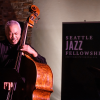
Phil Sparks
bassWhen Tula's closed its doors in October 2019, the discussion had already begun that led to the idea of a jazz nonprofit in Seattle. Much of the discussion involved Tula's manager Jason Moore relocating the club after its ultimate demise. Others placed hope in new jazz spots popping up like magic, as they always had to some degree. None of that happened—before, during or after the devastating blow dealt by the pandemic. What was left standing was the idea that has materialized in the community in the form of the SJF jazz room at 109 S. Main St.
Where are young jazz fans coming from?
With the move to Pioneer Square into their own controllable space, the Fellowship began programming community events including a weekly jam session on Monday nights. Marriott had hosted a Monday night session in the south end Columbia City neighborhood at The Royal Room for the past year that had drawn well in terms of musician participation. The jam started at 9 PM, essentially excluding younger student players from Seattle's stellar high school jazz programs. Audience participation was there, but the hang was dominated by musicians in terms of actual numbers. With the late-night session on Tuesday nights at the nearby Owl 'n Thistle established, the decision was made to begin the new Monday night jam in Pioneer Square at 7:30 PM. The time, combined with the all-ages nature of the space, caters to a younger audience. At first, musicians showed up in force, instrument cases scattered throughout the room marking their presence. Soon, that would change in a startling way.When college-aged students began to show up, the word got out via TikTok and YouTube videos that there was "free jazz on Monday nights" in Pioneer Square. On Martin Luther King Day, they turned out in force, with the room tightly populated to maximum capacity with mostly 18-to 25-year-old patrons. The door needed to be held, prompting a sidewalk crowd of 40 people waiting to get in. The house band led by Marriott got the party started before the jam session, the audience surprisingly all in. They listened, they applauded after solos, at one point, even requested a few audience members speak at a polite minimum so they could hear the music. This phenomenon was to be more than a one-shot deal—the crowds have continued to show up on Monday nights, giving Seattle musicians the opportunity to display their wares in front of a large, live and enthusiastic crowd. Where did these kids come from, and how did they get involved with jazz music? That was the question on the lips of the regulars at 109 S, Main. Discussions on the sidewalk outside of the venue provided diverse answers to that question, but the presence on social media created by young fans who had actually attended the session was the driving force. Still, it was the music, the vibe of the return, and discovering this great music that has allowed a sudden explosion to be a sustainable thing. Marriott's reaction mirrors that of Fellowship regulars who have attended on a weekly basis.
"What a gift. What can you say about it," he says. "It's just super encouraging that we're seeing a generation of people that's coming to hear the music, that don't have preconceived ideas about it. They have an open mind about it and are willing to experience it live. They're experiencing jazz for the first time in a live setting, rather than on records or on the radio—that's super vital to growing the audience. It's our job to take care of it."
The actual nonprofit approach was providing success in drawing an audience that never would be seen at dinner clubs such as Tula's, or backroom bar sessions that require patrons to be21 years of age. The Fellowship's Monday night audience is likely half over legal age, judging by beverage sales. But their underage friends could attend with them, with the music being the binding connection for the evening. There were those already familiar with jazz, even some that came specifically to see the opening set by the Thomas Marriott Quartet. But for most, it was a life probe into something new and fun, something with artistic relevance as well. Like most jazz fans for whom the music becomes paramount, the experience of live jazz is the draw that may lead some to recordings and other facets of jazz culture. For the completely unacquainted, seeing artistic excellence that in a way was "serious," approached as something holy, was a far sight different from popular culture. With the jazz audience being in a state of participation as listeners, they could feel something different, something personal, something of physical and spiritual value. The nonprofit in this way, is doing work that is so important, so essential to the forward journey of the music in its city and beyond its borders.
The weekly Thursday-Saturday schedule features Seattle area artists, for the most part, performing original compositions and interpretations of jazz standards. Receiving a living wage for their efforts, leaders are able to rehearse and prepare properly in an effort to give their absolute best effort. Audiences have been the happy recipients of this methodology that puts the music and the musician first. For Marriott and the SJF board of directors, the daily grind of running a nonprofit, while being fully engaged with the forward movement of jazz music in Seattle is a lot of work, and very different work than what may have befallen a jazz club proprietor of any generation in the city's enlightened jazz history. It's new territory, one being traversed with grace by Marriott and the board.
"It's been a lot of work. It's manageable. There's a production aspect to it, there's just a series of layers to running the nonprofit. I'm getting better at it, but I'm also very much learning on the job. The board of directors that we have right now is really strong and engaged, which I really appreciate—they're really all in. We have some nice momentum going forward," says Marriott.
The first year of the new Pioneer Square digs has seen the nonprofit bring some touring acts in, if for no other reason than to set the bar high for what goes on in the room year round with local talent. Sets led by " data-original-title="" title="">Tarbaby with

Orrin Evans
pianob.1975

Nasheet Waits
drumsb.1971

Eric Revis
bassb.1967

Peter Bernstein
guitarb.1967

Ben Wolfe
bassb.1962

Ray Vega
trumpet
Victor North
saxophone, tenorb.1967
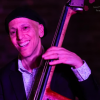
David Ambrosio
bassb.1968

Donny McCaslin
saxophone, tenorb.1966

David Kikoski
pianob.1961

Brandon Lee
trumpetb.1983

Victor Lewis
drumsb.1950

Brittany Anjou
pianob.1984

Jessica Lurie
saxophone
Dawn Clement
piano
Ben Feldman
bassb.1999
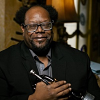
Cecil Young
trumpetThe week prior to the writing of this piece featured out-of-towners in drummer

Joe Farnsworth
drumsb.1968

Sarah Hanahan
saxophone, alto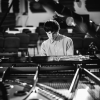
Roman Goron
piano
Michael Glynn
bass, acousticThe Seattle Jazz Fellowship is presenting "Jazz Night in Pioneer Square" on February 18, 2025 in 13 venues along First Avenue, Occidental and Second Avenue near Cherry St. Thirteen bands led by resident artists will perform in 13 venues beginning at 6 PM, with the evening's migration culminating at the Owl 'n Thistle for the weekly jam session there. The session, which takes place in the back room of an Irish dive bar, has been a Tuesday-night staple in Seattle since 1998. The session has been visited by the likes of

Wynton Marsalis
trumpetb.1961

Roy Hargrove
trumpet1969 - 2018

Branford Marsalis
saxophoneb.1960

Emmet Cohen
pianob.1990

Jacqueline Tabor
vocalsb.1970

John Bishop
drumsb.1959
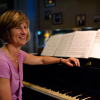
Ann Reynolds
piano
Marc Seales
pianob.1963

Jovino Santos Neto
pianob.1954

Jay Thomas
saxophone, tenorb.1949
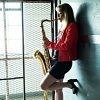
Kate Olson
saxophoneThe presence of Seattle Jazz Fellowship Artist-In-Residence Priester not only during his monthly "Julian Speaks" sessions, but in terms of impacting the entirety of the program cannot be overstated. If jazz is something integral in your life, whether that be as a musician, writer, or patron of the art, it is certain you have developed strong personal feelings about the music and its impact on our culture. Whether that impact is felt or experienced musically, sociologically, spiritually or all of the above—conversations with Priester will create understanding and in a way, offer validation of those sparks of humanity ignited by the music. His very participation in so many important recordings and events in jazz history is a precious resource offered and received in love and reverence. In all, he is a friend to the more than 700 members of the Seattle Jazz Fellowship, someone who may drop by for the same reason that the rest of us show up—to listen. "Jazz attracts an audience that knows how to listen," he stated at his most recent Saturday afternoon event. We then all listened to a piece he recorded with Sun Ra in the late '50s, realizing we were all part of the history of this music, in the moment.
Tags
What is Jazz?
Thomas Marriott
Paul Rauch
Seattle Jazz Fellowship
Seattle Jazz Fellowship: A New Beginning For Live Resident Jazz
D'Vonne Lewis
Julian Priester
Miles Davis
Aretha Franklin
John Coltrane
Bill Evans
Art Blakey & The Jazz Messengers
Dexter Gordon
Ernestine Anderson
Quincy Jones}] and {{Ray Charles
Matt Jorgensen
Rick Mandyck
Mark Taylor
Phil Sparks
Tarbaby
Orrin Evans
Nasheet Waits
Eric Revis
Peter Bernstein
Ben Wolfe
Ray Vega
Victor North
David Ambrosio
Donny McCaslin
David Kikoski
Brandon Lee
Victor Lewis
Brittany Anjou
Jessica Lurie
Dawn Clement
Ben Feldman
Cecil Young
Joe Farnsworth
Sarah Hanahan
Roman Goron
Michael Glynn
wynton marsalis
Roy Hargrove
Branford Marsalis
Emmet Cohen
Jacqueline Tabor
John Bishop
Ann Reynolds
Marc Seales
Jovino Santos Neto
Jay Thomas
Kate Olsen
Comments
PREVIOUS / NEXT
Thomas Marriott Concerts
Sep
23
Tue
Freefall
Seattle Jazz FellowshipSeattle, WA
Oct
7
Tue
Freefall
Seattle Jazz FellowshipSeattle, WA
Oct
21
Tue
Freefall
Seattle Jazz FellowshipSeattle, WA
Nov
4
Tue
Freefall
Seattle Jazz FellowshipSeattle, WA
Nov
18
Tue
Freefall
Seattle Jazz FellowshipSeattle, WA
Dec
2
Tue
Freefall
Seattle Jazz FellowshipSeattle, WA
Dec
16
Tue
Freefall
Seattle Jazz FellowshipSeattle, WA
Support All About Jazz
 All About Jazz has been a pillar of jazz since 1995, championing it as an art form and, more importantly, supporting the musicians who make it. Our enduring commitment has made "AAJ" one of the most culturally important websites of its kind, read by hundreds of thousands of fans, musicians and industry figures every month.
All About Jazz has been a pillar of jazz since 1995, championing it as an art form and, more importantly, supporting the musicians who make it. Our enduring commitment has made "AAJ" one of the most culturally important websites of its kind, read by hundreds of thousands of fans, musicians and industry figures every month.





 Buy Now
Buy Now







